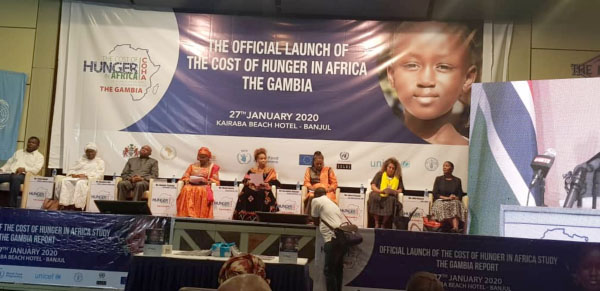
The
government of The Gambia in partnership with the European Union and its UN
partners on Monday officially launched Gambia Cost of Hunger in Africa (COHA)
study report at a ceremony held at a hotel in Kololi.
It could be recalled that the COHA study in
The Gambia was officially launched by the former vice president in December
2018 with the objectives of providing evidence to justify the need to increase
investment in nutrition.
The
study was also aimed at providing compelling arguments to support the concept
of Human Capital gain that will help consolidate Africa’s economic expansion,
as well as to eliminate the social and economic impact of undernourishment of
children at the level of health and
education sectors and labour productivity.
The
study sought to estimate in a given year the additional cases of morbidity,
mortality, school repetition, school drop-out rates and reduced physical
capacity that could be associated with a person’s under nutrition status before
age five.
Speaking
at the event, Dr. Isatou Touray, vice president of The Gambia, informed that
The Gambia is amongst 26 countries globally to validate the COHA findings in
Africa.
“In
The Gambia, the study has been taken by a multi-state holder national
implementation team, under the leadership and guidance of NaNA and with
technical support from the World Food Programme and the Economic Commission for
Latin America and the Caribbean,” she said.
The
COHA study, Dr. Touray added, is an African Union initiative that receives
endorsement at the highest level from the African Heads of State and
governments and that the endorsement solidified an earlier resolution backed by
the African Ministers of Finance and Economic development, who in 2012
initially validated the methodology that was adopted and rolled out
continent-wide.
She
expressed gratitude in participating in the study, which she said, represents a
unique and timely contribution to help them understand the impact of child
under nutrition in the country’s socio economic development.
UN
resident coordinator in The Gambia, Seraphine Wakana, said malnutrition is a
multi-faceted problem that is responsible for millions of deaths across the
globe.
She
indicated that those who survived it serve the consequences for the rest of
their lives, adding that productivity due to malnutrition, is entirely
unacceptable as it does not only cause adversity of individual and societies
affected but also translates to a vast amount of financial loses to the
national economy which engage all public investment.
“This
disease will not be achieved unless hunger together with food and nutrition
insecurity is eliminated.”
For his part, Bakary Sanyang, governor of West
Coast Region, maintained that the government has already under its NDP
2018-2021, committed itself to continue pursuing the United Nations Sustainable
Goal targets in education, health and nutrition among others.
“This
study report on The Gambia will
undoubtedly point to this undisputed fact that when nutrition in children is not given the utmost priority;
then our health, education and other productive sectors will continue to show
serious shortcomings and big challenges,” he stated.


